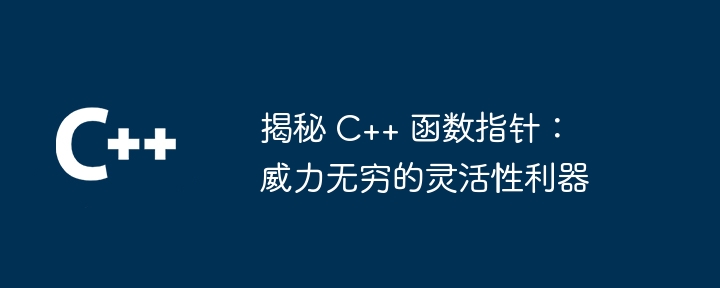
The role of function pointer in C: A function pointer is a pointer that points to a function and allows dynamic calling of the function. Function pointers are widely used in callback functions, event handling, and abstract programming. Advantages include flexibility, abstraction, and performance, but there are also security concerns, type conversions, and maintainability limitations.

Revealing the Secret of C Function Pointers: A Powerful Flexibility Tool
Introduction
A function pointer is a pointer to a function that allows us to call functions in a dynamic and flexible way. In C, function pointers have a wide range of applications, including callback functions, event handling, and abstract programming.
Grammar
The function pointer is defined as follows:
returnType (*functionName)(argumentList);
Among them:
returnType Is the return value type of the function functionName Is the name of the pointer variable pointing to the function argumentList Is the parameter list required by the function Practical case: callback function
The callback function is a function called by other functions. The following is an example of using a function pointer to implement a callback function:
// 定义一个回调函数原型
typedef void (*CallbackFunction)(int);
// 定义一个使用回调函数的函数
void CallCallback(CallbackFunction callback, int value) {
callback(value);
}
// 定义一个回调函数
void PrintValue(int value) {
std::cout << value << std::endl;
}
// 主函数
int main() {
// 将回调函数赋值给函数指针
CallbackFunction printValueCallback = &PrintValue;
// 调用使用回调函数的函数
CallCallback(printValueCallback, 10);
return 0;
}Application scenarios
Function pointers have many application scenarios in C, including:
Advantages
Using function pointers has the following advantages:
Limitations
Function pointers also have some limitations:
The above is the detailed content of Demystifying C++ Function Pointers: A Powerful Flexibility Tool. For more information, please follow other related articles on the PHP Chinese website!
 The difference between typedef and define
The difference between typedef and define
 Usage of typedef in c language
Usage of typedef in c language
 What are the differences between c++ and c language
What are the differences between c++ and c language
 Recommended learning order for c++ and python
Recommended learning order for c++ and python
 Cost-effectiveness analysis of learning python and c++
Cost-effectiveness analysis of learning python and c++
 Is c language the same as c++?
Is c language the same as c++?
 Which is better to learn first, c language or c++?
Which is better to learn first, c language or c++?
 The difference and connection between c language and c++
The difference and connection between c language and c++




